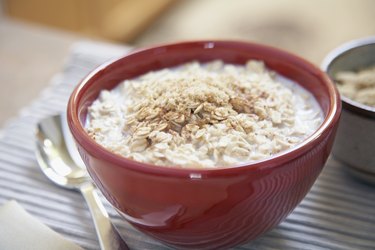
If you've heard you can eat to beat candida via the candida diet, you may be wondering what that diet really entails — and, specifically for oatmeal fans, if the breakfast favorite makes the cut. Here's the deal on the candida diet and whether or not oatmeal gets the green light.
Read more: Phase 1 of the Candida Diet
Video of the Day
Video of the Day
The Candida Diet
Also called the candida cleanse diet, the candida diet aims to prevent the onset of health problems that some have linked to the excessive growth of a common but usually harmless fungus-like organism called Candida albicans, according to the Mayo Clinic.
The organism is found naturally in the human gut and — per the Centers for Disease Control and Prevention (CDC) — also in the mouth, throat, gut and vagina.
"The candida diet is one that advocates for avoidance of sugar, white flour, yeast, gluten, alcohol, caffeine, nuts and seeds that are susceptible to mold growth, cheese, fermented foods and other highly processed foods," says St. Louis, Missouri-based Connie Diekman, MEd, RD, registered dietitian and former president of the Academy of Nutrition and Dietetics.
Yes to Oatmeal
But if you dig oatmeal and you are on — or considering — the candida diet, you'll likely be pleased to know that "oatmeal, if processed in an area that does not have cross-contact with gluten-containing grains, would be acceptable," Diekman says.
Even oat milk would be OK, she adds, given that "the key on oat milk is the sugar content. Added sugar would make the difference," she says. "So you would need to find unsweetened oat milk."
And if the taste of coconut happens to strike your fancy, you might consider adding a touch of coconut oil to your favorite oatmeal concoction.
This is according to one of the only studies on the issue, out of Tufts University and published by the American Society for Microbiology in November 2015 in mSphere. Though the study involved mice — and needs to be replicated in humans — the research team found that adding coconut oil to the diet appeared to curtail candida growth compared to mice who were fed beef fat or soybean oil.
No to Beer, Bread and Wine
On the other side of the coin, the Cleveland Clinic specifically mentions a few foods that encourage candida growth and therefore are decidedly not candida diet-approved.
Those include bread, beer and wine, because all are heavy in sugar and yeast, both of which are thought to foster candida growth.
Does the Candida Diet Work?
To be clear, the Tufts University study team cautions that there really isn't much research definitively proving that the candida diet actually works.
On the pro side, there's a small 2019 investigation funded by the Polish National Institute of Public Health (PNIPH) in Roczniki Państwowego Zakładu Higieny. After analyzing the unrestricted eating habits of a group of 30 people, the study team found that candidiasis risk was higher among those whose routine eating habits happened to favor processed white flour over whole-grain flour or wheat-flour substitutes such as oat flour, rye flour and buckwheat flour.
But the PNIPH study didn't assess the candida diet per se, and Diekman remains unimpressed. "The problem with the diet is that no scientific evidence indicates that it helps reduce or control the development of candida," she says.
The Mayo Clinic agrees, adding that there's little to show that a candida diet has health benefits of any kind. In fact, yeast overgrowth may not truly be a medical problem to begin with.
Still, the Mayo Clinic does acknowledge that dropping sugar, white flour and processed foods — in favor of whole-grain foods such as oatmeal — is, generally speaking, a healthy move and could tend to make people feel better overall.
Read more: Which Nuts Are Allowed on the Candida Diet?
- Connie Diekman, MEd, RD, LD, FADA, food and nutrition consultant; former president, Academy of Nutrition and Dietetics; coauthor, The Everything Mediterranean Diet Book; former director, university nutrition, Washington University, St. Louis, Missouri
- Mayo Clinic: “What Is a Candida Cleanse Diet and What Does It Do?”
- Centers for Disease Control and Prevention: “Candidiasis”
- Roczniki Państwowego Zakładu Higieny: “The Influence of Diet on Gastrointestinal Candida Spp. Colonization and the Susceptibility of Candida Spp. to Antifungal Drugs”
- mSphere: “Manipulation of Host Diet to Reduce Gastrointestinal Colonization by the Opportunistic Pathogen Candida albicans”
- Cleveland Clinic: “Thrush: Prevention"
Is this an emergency? If you are experiencing serious medical symptoms, please see the National Library of Medicine’s list of signs you need emergency medical attention or call 911.